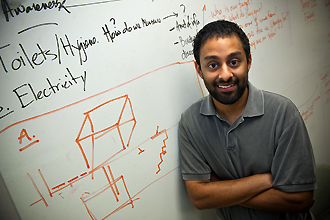Let the toilet revolution begin
A group of Tulane University students led by Anoop Jain won $30,000 this week in the Dell Social Innovation Challenge, one of the largest international business plan contests for social entrepreneurs.

Public health student Anoop Jain is leading The Humanure Power Project, which seeks to convert toilet waste into power in India. (Photo by Paula Burch-Celentano)
The Humanure Power Project, which was founded by Jain and three other Tulane public health students, placed second in the Dell Challenge out of more than 1,780 entrants from around the world.
The venture aims to provide sanitation and electricity to rural India by building community toilets and harnessing methane gas from human waste to produce electricity that will be distributed to the community via 12-volt batteries.
“This is a big win for us. It legitimizes so much of what we have been working for,” says Jain, a graduate student in global community health. “It's going to help us establish the critical infrastructure to start testing our system in a pilot program.”
The Humanure Power Project (HPP) is run by principals Jain, Art Adhatamsoontra, Andrew Ryan and Alec Barber-Grossi, and advised by School of Architecture graduate students Mary Beth Luster and Emma Jasinski. The team worked in the spring semester with the Tulane Changemaker Institute to refine the project.
Roughly 650 million people in India live without toilets and 400 million lack electricity. HPP plans to build 10 public toilets in a small village in Bihar to determine how much energy can be produced daily.
The pilot project could produce 200 pounds of waste, providing up to 1,200 cubic feet of methane gas per day. A cubic foot can store enough battery power to light a 60-watt bulb for 6 hours, Jain said.
The company will rent reusable 12-volt batteries to earn money to buy more toilets. The goal is to create a sustainable model that spreads across India and throughout the world.
Jain isn't afraid to dream big. “We are trying to be the best. We believe in our project and how big an impact it will have on the lives of millions of people.”
